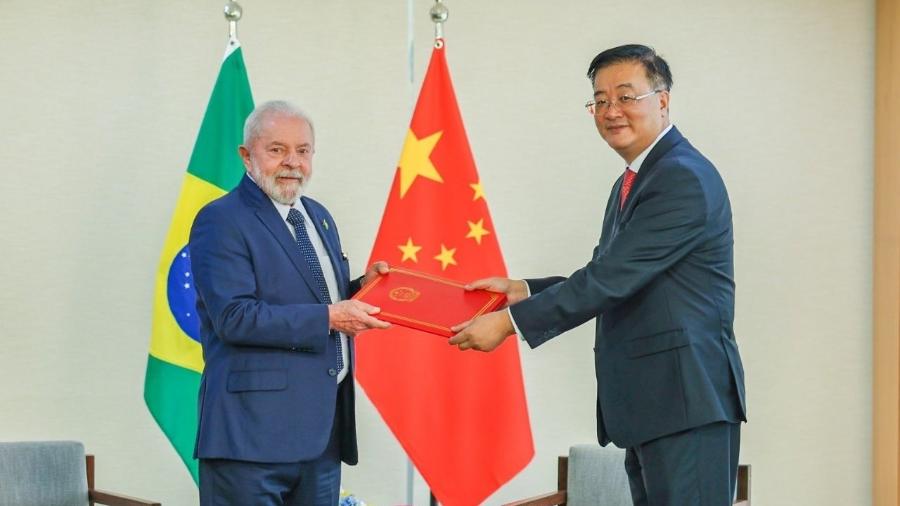
Published 03/24/2023 15:06 | Edited 03/25/2023 12:35 PM
One of the main international commitments at the beginning of this government, the visit of President Luiz Inácio Lula da Silva to China takes place amidst a series of positive prospects for partnerships between the two countries and the resumption of relations at a high level, after four years of lowliness. and animosities on the part of Jair Bolsonaro (PL).
Even with the postponement of Lula’s departure — which was due to take place this Saturday (25) and should be delayed until Sunday (26) due to a mild pneumonia that affects the president — for the time being, important agendas are maintained both for the strengthening of diplomatic relations and for the commercial ones, in addition to joint social projects.
If, with Bolsonaro, Brazil ended up aligning itself with the moral and neoliberal agendas of the extreme right, distancing itself from the real interests of the country and the people, with Lula the focus on development and the social transcends Brazilian borders.
As reported by columnist Jamil Chade, from UOL, one of the main partnerships, among the 20 agreements to be signed, would be a joint initiative to combat hunger and extreme poverty, to be signed by Lula and Chinese President Xi Jinping. The agreement, writes Chade, “provides a clause for multilateral collaboration, including the construction of an alliance against hunger”, an agenda that was present in his previous administrations and has been signaled by Lula as a priority since the elections.
In a country the size of China, with more than 1.4 billion people, the fight against hunger and extreme poverty is a constant challenge — even so, the country, led by the Communist Party, was the first to reach the UN goals to halve the number of people in extreme poverty by lifting millions of Chinese out of it.
Considering the Brazilian proportions and particularities, the challenge facing the country, which since at least redemocratization has been experiencing a constant situation of social advances and setbacks, is also great. According to IBGE data released at the end of 2022 based on the year 2021, at least 62.5 million Brazilians (equivalent to 29.4% of the total population) lived below the poverty line, of which 17.9 million were extremely poor (8.4% of the population), record numbers in the country. And eight years after leaving the UN Hunger Map, in 2022 Brazil had more than 33 million people with no guarantee of what to eat, with 14 million new Brazilians in a situation of hunger, according to the Second National Survey on Food Insecurity in the Context of the Covid-19 Pandemic, from the Penssan network.
“Belt and Road”

In addition to this urgent issue, the agreements may also be linked to the so-called “Belt and Road” (or “Belt & Road”), a global Chinese program aimed at investment and infrastructure. “The People’s Republic of China, with the Belt and Road Initiative and the firm decision to build a ‘community of shared destiny’, offers the world another globalization: inclusive, tolerant, pacifist and that generates value and material wealth for all countries involved in the Belt and Road projects”, explains Elias Jabbour, assistant professor at Uerj and author of the book “China, the socialism of the 21st century”, in partnership with Alberto Gabriele.
Read too: China and a new globalization
According to Maria Cristina Fernandes, from Valor Econômico newspaper, “so far, 150 countries have joined (the Chinese initiative), more than 3,000 projects are underway with costs in the billions of dollars”. “There is no reason for Brazil not to enter”, says Celso Amorim, head of the Presidency’s Special Advisor for International Affairs, according to the journalist.
Maria Cristina Fernandes also says that “an eventual entry of Brazil into the Chinese initiative, in the Itamaraty’s view, will not harm the Mercosur agreement with the European Union, given that almost all of South America is part of the ‘Belt & Road’, and three European bloc countries also do it”.
The visit also has an important symbolic meaning: in 2023, it will be 50 years since the beginning of trade relations between the two countries, leveraged since the first Lula government, in 2003. According to the Planalto Palace, in 2022 China will imported more than US$ 89.7 billion in Brazilian products, especially soybeans and ores, and exported almost US$ 60.7 billion to the domestic market. The traded volume, US$ 150.4 billion, grew 21 times since Lula’s first visit to the country, in 2004.
According to the Itamaraty Asia and Pacific Secretary, Ambassador Eduardo Paes Saboia, to Agência Brasil, on the 17th, “many agreements are being negotiated, we have 20 closed, but this number could increase”. He also said that “we have health protocols, a series of agricultural products, agreements in the areas of education, culture, finance, industry, science and technology”.
Read too: China sets growth close to 5% for a challenging 2023
One of these projects, according to the government, is for the construction of CBERS-6, the sixth of a line of satellites built in partnership between Brazil and China. The differential of the new model is a technology that allows the monitoring of biomes such as the Amazon Forest even with clouds. “Our hope is to start building CBERS-6 in the coming months. This is essential to strengthen our Amazon monitoring agencies and carry out climate studies”, said recently the Minister of Science, Technology and Innovation, Luciana Santos, who will participate in the trip.
Agenda
This Friday (24), when the postponement of the departure of Lula and his entourage was informed, the government informed that the trip will only be maintained if the president is in good health conditions. In addition to the president and ministers, the group that will visit China is made up of at least 20 parliamentarians and 240 businessmen.
Prior to the announcement, the entourage’s agenda foresaw — as disclosed by the Planalto Palace — meetings in Beijing, on the 28th, between Lula and the president of China, Xi Jinping, with the prime minister of China, Li Qiang, and with the President of the National People’s Congress, Zhao Leji. The bilateral agenda will involve trade, investment, reindustrialization, energy transition, climate change, cooperation and peace agreements.
Read too: Brazil and China will announce “various impact programs”
For the 29th, a business event is scheduled, promoted by the Sino-Brazilian High Level Commission and by the Ministry of Development, Industry, Commerce and Services, with the participation of more than 240 Brazilian businessmen. An event is also planned for the 27th, promoted by Cebri (Brazilian Center for International Relations), with around 100 businessmen.
On the 30th, the agenda indicates that president Lula will go to Shanghai, where he will visit the headquarters of the New Development Bank, an entity created by the BRICS (a group formed by Brazil, China, India, Russia and South Africa) to promote projects in countries under development.
Source: vermelho.org.br

